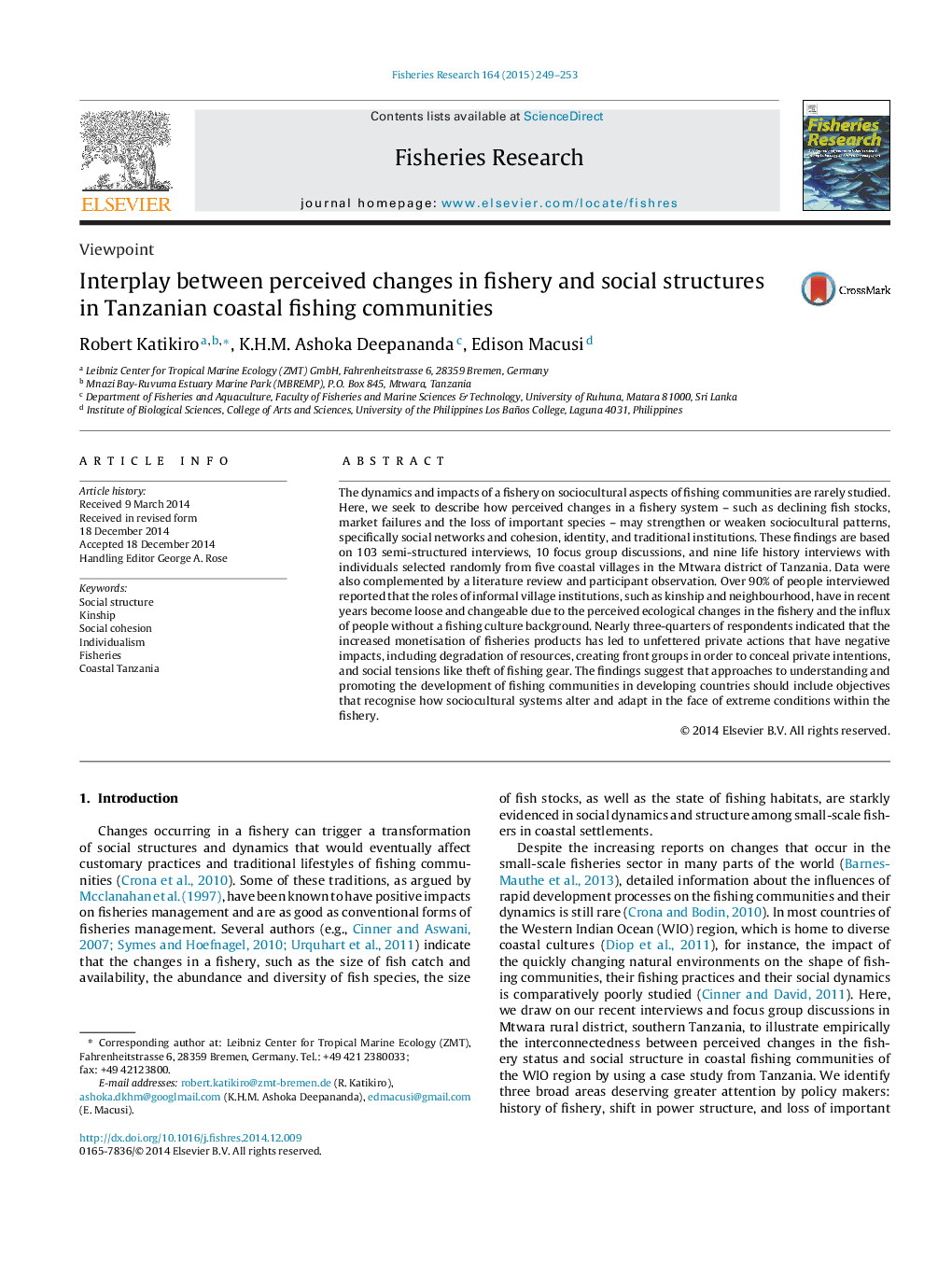| کد مقاله | کد نشریه | سال انتشار | مقاله انگلیسی | نسخه تمام متن |
|---|---|---|---|---|
| 6385714 | 1626804 | 2015 | 5 صفحه PDF | دانلود رایگان |
عنوان انگلیسی مقاله ISI
Interplay between perceived changes in fishery and social structures in Tanzanian coastal fishing communities
ترجمه فارسی عنوان
تعامل بین تغییرات درک شده در ماهیگیری و ساختارهای اجتماعی در جوامع ماهیگیری ساحلی تانزانیا
دانلود مقاله + سفارش ترجمه
دانلود مقاله ISI انگلیسی
رایگان برای ایرانیان
کلمات کلیدی
ساختار اجتماعی، خویشاوندی، انسجام اجتماعی، فردگرایی، شیلات، تانزانیا ساحلی،
ترجمه چکیده
پویایی و تاثیرات یک ماهیگیری بر جنبه های اجتماعی-فرهنگی جوامع ماهیگیری به ندرت مورد مطالعه قرار می گیرد. در اینجا ما می خواهیم توضیح دهیم که چگونه تغییرات درک شده در یک سیستم ماهیگیری مانند کاهش ذخایر ماهی، از دست رفتن بازارهای مهم و از دست دادن گونه های مهم می تواند الگوهای اجتماعی فرهنگی، به ویژه شبکه های اجتماعی و انسجام، هویت و نهادهای سنتی را تقویت یا تضعیف کند. این یافته ها بر اساس 103 مصاحبه نیمه ساخت یافته، 10 بحث گروه های متمرکز و 9 مصاحبه تاریخ زندگی با افرادی که به طور تصادفی از پنج روستای ساحلی در ناحیه متوارا تانزانیا انتخاب شده اند، استوار است. داده ها نیز توسط بررسی ادبیات و مشاهدات شرکت کنندگان تکمیل شد. بیش از 90٪ از مصاحبه شوندگان گزارش داده اند که نقش موسسات غیر روحانی روستایی، مانند خویشاوندی و محله، در سال های اخیر به علت تغییرات محیط زیستی در ماهیگیری و هجوم مردم بدون پسزمینه فرهنگی ماهیانه تغییر کرده است. تقریبا سه چهارم پاسخ دهندگان نشان داد که افزایش درآمد ماهیانه محصولات شکارچی منجر به اقدامات خصوصی منحصربفردی شده که اثرات منفی دارد، از جمله کاهش منابع، ایجاد گروه های جلو برای مخفی کردن اهداف خصوصی و تنش های اجتماعی مانند سرقت وسایل ماهیگیری. یافته های این پژوهش نشان می دهد که رویکردهای درک و پیشبرد توسعه جوامع ماهیگیری در کشورهای در حال توسعه شامل اهدافی است که به تشخیص اینکه سیستم های اجتماعی فرهنگی در شرایط شغلی در شرایط شغلی تغییر و سازگار می شوند.
موضوعات مرتبط
علوم زیستی و بیوفناوری
علوم کشاورزی و بیولوژیک
علوم آبزیان
چکیده انگلیسی
The dynamics and impacts of a fishery on sociocultural aspects of fishing communities are rarely studied. Here, we seek to describe how perceived changes in a fishery system - such as declining fish stocks, market failures and the loss of important species - may strengthen or weaken sociocultural patterns, specifically social networks and cohesion, identity, and traditional institutions. These findings are based on 103 semi-structured interviews, 10 focus group discussions, and nine life history interviews with individuals selected randomly from five coastal villages in the Mtwara district of Tanzania. Data were also complemented by a literature review and participant observation. Over 90% of people interviewed reported that the roles of informal village institutions, such as kinship and neighbourhood, have in recent years become loose and changeable due to the perceived ecological changes in the fishery and the influx of people without a fishing culture background. Nearly three-quarters of respondents indicated that the increased monetisation of fisheries products has led to unfettered private actions that have negative impacts, including degradation of resources, creating front groups in order to conceal private intentions, and social tensions like theft of fishing gear. The findings suggest that approaches to understanding and promoting the development of fishing communities in developing countries should include objectives that recognise how sociocultural systems alter and adapt in the face of extreme conditions within the fishery.
ناشر
Database: Elsevier - ScienceDirect (ساینس دایرکت)
Journal: Fisheries Research - Volume 164, April 2015, Pages 249-253
Journal: Fisheries Research - Volume 164, April 2015, Pages 249-253
نویسندگان
Robert Katikiro, K.H.M. Ashoka Deepananda, Edison Macusi,
